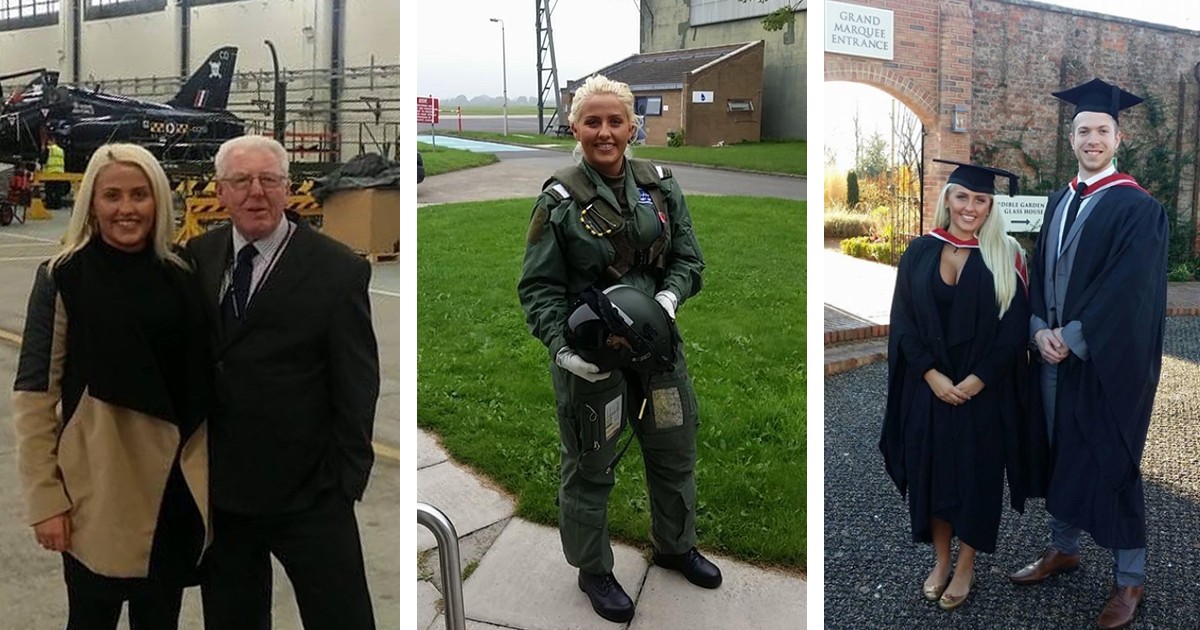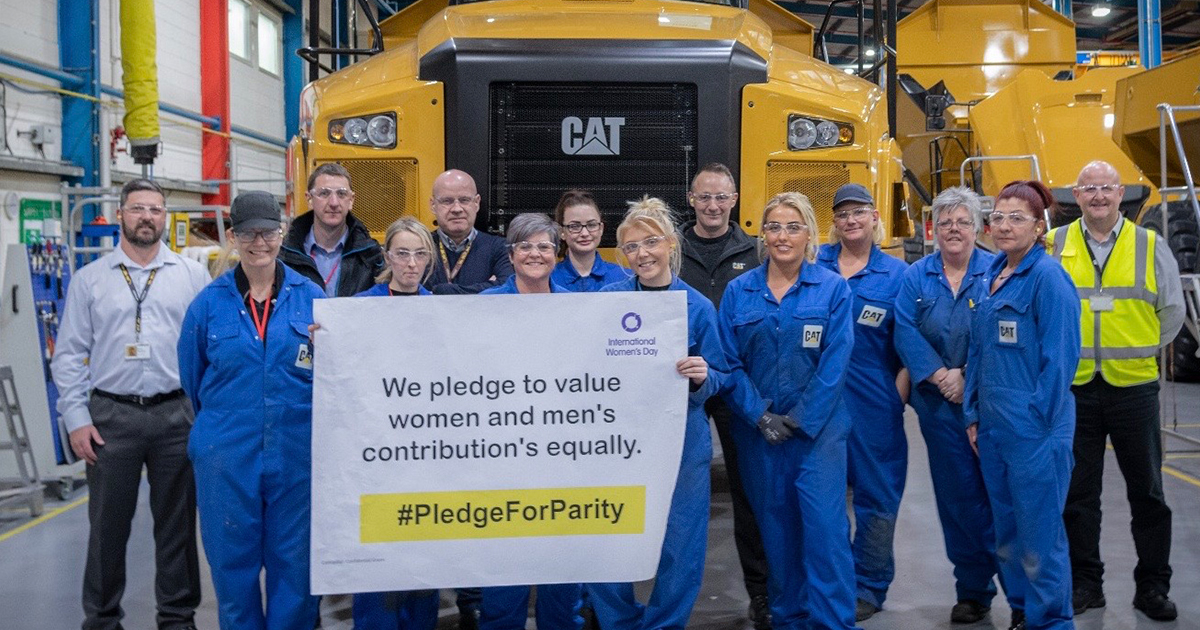BTEC Higher Nationals Case Study: Abygail Dent
Abygail (Aby) Dent studied a BTEC Level 3, followed by a BTEC Higher National Diploma in Aeronautical Engineering with Hartlepool College in the North-East of England. She spoke to us about her experience as a woman in the engineering sector.
Unexpected motivation
During our conversation, Aby comes across as a very bubbly character, and it is clear that she thoroughly enjoyed her HND. Interestingly, she describes herself as somewhat un-motivated student as a teenager, putting the bare minimum into assignments and just doing what she needed to pass.
The possibility of continuing to further study hadn’t even crossed her mind, as it did not feel like a priority at that point. However, towards the end of her level 3 course her mindset shifted; she felt driven and energised to expand her knowledge, leading her to pursue a BTEC Higher National.
“I believe the turning point was when I unintentionally achieved an excellent grade in one of my assignments, this was a good feeling and I knew that, by just doing that little bit more, I could get better grades. In my remaining time at college, I knuckled down and ensured that I achieved the best grades possible.”

Practical experience in the workplace
Choosing to stay on at Hartlepool College of Further Education was an easy decision for Aby; she described the campus as having fantastic facilities for aerospace, as well as excellent links with industry. Aby speaks highly of her time working alongside the Babcock Engineers at RAF Leeming, which was unique to students at Hartlepool College.
“We were able to witness the engineers carrying out maintenance on the BAE Systems Hawk, also known as the Red Arrows. I specifically recall taking part in the testing of the Ram Air Turbine which was used as a back-up if both hydraulic systems failed. There were numerous things I learnt from the several visits we had at Leeming - we even were given maintenance paperwork to complete, to give us a feel of what it would be like to be engineers ourselves.”
Aby was able to apply this knowledge to her hydraulics unit within the Higher National qualification, and it was the experience at RAF Leeming that made her realise she would love to design gas turbine engines in the future.
One other benefit to staying at the same college was that the lecturers already knew Aby, and how best to support her in her studies. She therefore found the transition from Level 3 to Level 4 smooth, and she enjoyed the extra level of depth and knowledge that the Level 5 brought. Her favourite aspect of the course was learning about hydraulics, pneumatics and gas turbine engines – she specifically liked looking at the design aspect of it all.
Pursuing an apprenticeship and degree
Whilst at college, she started a new apprenticeship with Babcock, having gained a place as an Aircraft Engineer. Aby worked at RAF Linton-On-Ouse, on a fleet of aircraft (Grob Tutors) used in the first phase of fast jet pilot training. As this aircraft was not as advanced as the Hawks that she had worked on before, Aby felt that she could have used her skills for more challenging projects.
Although she felt most proud of her work during this time, she also felt that she wasn’t progressing in the right way; working towards an NVQ didn’t seem relevant to her career and she therefore decided to leave after a year and pursue the university route instead, as she had really enjoyed learning during her Higher National.
“When I made the decision to leave Babcock to go to university, I also applied for a place on the RAF University Air Squadron and was successful. I loved flying and therefore I took this opportunity to do so while I was still within the appropriate age range.”
We discussed her experience doing an undergraduate BEng in Petroleum and Gas Engineering with Teesside University. Aby was able to join in the fourth year of her course, as the University offered credit for her HND, and she feels accomplished by saying she has achieved a degree.
She found university a very different experience to studying at college for her Higher Nationals; conscious of the fact that her qualification had been in a different subject, she felt that she had a lot of ground to cover. Nevertheless, it helped Aby increase her knowledge across a wider range of engineering subjects.
As an example, she particularly enjoyed choosing a project that she was passionate about - Underground Coal Gasification UCG, which at that time was particularly relevant to her local area in County Durham. As part of the project, she had to consider several external factors, including significant climate pollution, groundwater contamination and toxic waste, in order to weigh up the pros and cons.
As with many, Aby’s journey has had ups and downs. Looking back, she has realised that they may have been other routes better suited to her skills and ambitions. If advising others now, she would recommend that students consider all the available options before making any decisions on next steps.

A female pioneer
During her studies, Aby was able to build up her employability skills through the roles that she took on; for example, during her HND she worked as a support work for young adults with complex needs. Time-management, organisation and communication skills were vital during this period, to be able to understand the needs and behaviours of her clients, as well as complete her assignments on time.
Having taken some time to travel following her studies, she landed a job at Caterpillar Inc., which involved working on articulated trucks for mining. It was a very hands-on job and provided excellent experience. Aby decided that she really wanted to get into the product side of engineering, and so after taking time out to care for her son, she started back at Caterpillar as the first female maintenance technician in the team.
“I absolutely loved working for Caterpillar; it was on my doorstep, well-paid and most importantly the ambience was brilliant.”
Gender diversity in the sector
It is well-known that engineering has traditionally been a male-dominated industry; in 2020 the World Economic Forum wrote that female students and employees are under-represented in STEM-related fields. In June 2021, Engineering UK reported that women make up only 14.5% of all engineers. Increasing the number of girls and women studying STEM (Science, Technology, Engineering, Mathematics) subjects is therefore on government agendas in many countries worldwide.
Aby would love to see more women getting into engineering; at HND there was only one other female in her class. However, the picture isn’t all discouraging – Engineering UK also report that there has been an increase of 25.7% in women in engineering occupations since 2016, so some progress is being made to narrow the gender gap.
According to FE news, there are reports of sexism, a lack of role models and anxiety over career progression, which prevent women from pursuing a career in construction and engineering. Aby would like to change this perception and she feels passionately about encouraging girls to learn about engineering from a young age. As part of this dialogue, we are pleased to be able to share Aby’s story.
“Working in engineering is exciting; I feel like you are breaking the mould of a typical woman, and men are often surprised by this. I’ve learnt to accept that physically, some of the work carried out is not always as easy for a woman. Attitudes to women in engineering can still be a bit backward-thinking, and this is what I want to change.”
With the help of individuals like Aby, we can continue to drive change in the sector.